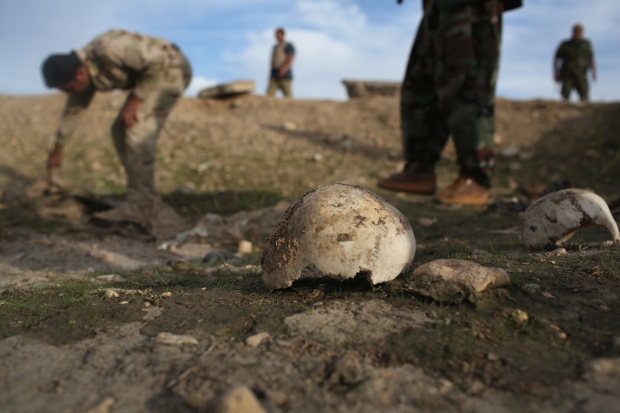Later today the House of Commons will vote upon a motion expressing belief that a genocide is underway against Christians, Yazidis and other ethnic and religious minorities in Iraq and Syria. The motion, proposed by Fiona Bruce MP, is supported by a large number of MPs from all parties.
The Government is expected to oppose, as they did when a similar measure was debated in the Lords. At the time of writing, party enforcers are rumoured to be whipping MPs on the payroll to abstain from the vote. This is an old parliamentary tactic intended to undermine the legitimacy and clout of the measure under consideration by reducing the number of MPs going through the lobbies (about 150 are on the payroll).
Surprised by this Machiavellian scheming? You shouldn’t be. It’s par for the course, and in the context of genocide, entirely predictable. The UK has never succeeded in recognising a genocide while one was ongoing. Our long-standing policy has been to wait until everyone is dead. This sounds incendiary. I’m not joking.
During Rwanda, the UK at the UN fiercely resisted using ‘genocide’ to describe the massacre. We maintained that we did not know what was happening – itself astonishing, given that at least 500,000 people were killed – and we were still refusing to name it genocide one year after the slaughter had ended.
The same ‘not enough evidence’ plea was deployed during the Bangladesh genocide, despite the fact that the Foreign Office had already been presented with evidence of the Pakistani Army’s atrocities. Declassified correspondence from 1971 between the FCO and the Indian High Commissioner reads baldly: ‘We have no evidence of genocide.’
And there is always an ever-so sensible legal excuse. During the Cambodian genocide, a senior Foreign Office legal adviser wrote: ‘The criterion for execution appears to have been political attitude (or assumed attitude) vis-a-vis the Cambodian government. It may therefore be difficult to establish that genocide has been committed.’
Fine. Except that it wasn’t difficult. The Cambodian genocide – in which at least 1.7 million people were killed – is one of the least contested in history. The sad truth? When it comes to genocide denial, no one does it better.
So, here we are nearly 70 years after the passing of the UN Genocide Convention and barely a day passes without a report of fresh depravities emerging from Iraq and Syria. But is it genocide?
The Convention defines genocide as the intentional destruction ‘in whole, or in part’ a national, ethnical, racial or religious group. The Convention goes on to list actions that, together with this intention, are constitutive of genocide: killing, forcible transfer, preventing births, inflicting upon that group conditions intended to destroy that group, and others.
Does anyone seriously doubt that the actions of Daesh are serious enough to meet this threshold? This genre of evil is so common in Iraq and Syria that we are bored of it. It doesn’t even make the news as I found out this week when a producer – who will remain nameless – complained of ‘genocide fatigue’ when I informed them that a 16-year-old Yazidi girl would be in Parliament to speak about the murder of her brother and father by Daesh.
Five dense dossiers have been compiled detailing these atrocities by the Office of the United Nations High Commissioner for Human Rights, the United Nations Assistance Mission for Iraq, the United States Commission on International Religious Freedom, the Simon-Skjodt Center for the Prevention of Genocide and the Knights of Columbus.
On the strength of this evidence, the EU Parliament, US Government, US Congress and Parliamentary Assembly of the Council of Europe have all said that this is genocide. Never before has there been such international support for recognising a genocide while atrocities were still underway. And yet still ministers parrot: ‘It’s a matter for the international judicial system’.
They are right, of course. The International Criminal Court has the final say. What they are not telling you is that the ICC has no jurisdiction in Iraq and Syria, and can only act if given the power by the UN Security Council. So the current policy of waiting for the ‘international judicial system’ really is a recipe for doing nothing.
And the fact that the ICC has the final say doesn’t prevent the UK from expressing its opinion that this is genocide. Indeed the Government’s own Minister, Tobias Ellwood, did exactly that the other day, likely defying the rancid brief handed to him by FCO bureaucrats. He said: ‘I, too, believe that a genocide has taken place.’ Good on him for refusing to genuflect to the traditional line – a line which has resulted in two recent mea culpas from successive Foreign Secretaries during the anniversaries of Srebrenica and Rwanda respectively.
As history repeats itself, we have to ask ourselves what lies behind this reluctance. It’s a tough one. Boris Johnson recently declared it ‘baffling’. The truth is that a lot hinges on this little word. Using it signals willingness to be bound by our obligations under the Genocide Convention, which are far-reaching and will cost.
But when the Genocide Convention was signed in 1948 and ‘never again’ resounded around Paris and beyond, there were no disclaimers allowing states to opt out when protecting endangered minorities became inconvenient or expensive. A genocide is underway in Iraq and Syria. Common humanity demands that we acknowledge it.






Comments